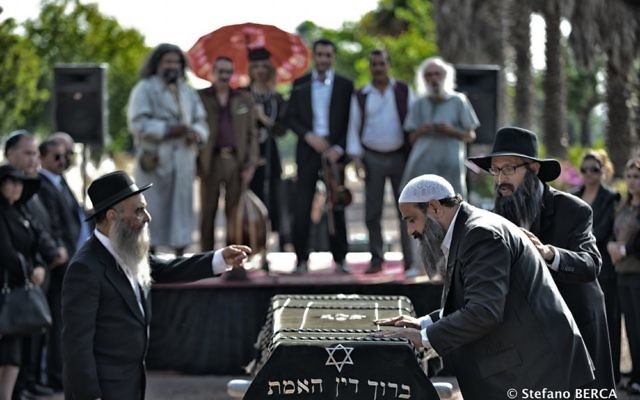Casablanca Goes Native in ‘Midnight Orchestra’
By Bob Bahr
Captain Renault (Claude Rains): What in heaven’s name brought you to Casablanca?
Rick (Humphrey Bogart): My health. I came to Casablanca for the waters.
Renault: The waters? What waters? We’re in the desert.
Rick: I was misinformed.
Not only was Bogart misinformed, but in “Casablanca,” the 1942 Hollywood classic, so were the screenwriters. They evidently forgot, for the sake of a witty line, that Casablanca was not a desert outpost somewhere in the Sahara, but a great Moroccan city on the Mediterranean. The waters, as Renault should have known, were everywhere.
But waters, schmaters, who cared in 1940s Hollywood exactly where Casablanca was?
Everyone knew it was, after all, nothing more than a flimsy set on the back lot at Warner Bros. And the only thing that mattered was where Casablanca was in our imagination.
Almost 75 years after the premiere of Hollywood’s Casablanca, a Moroccan film, “The Midnight Orchestra,” takes us back to Casablanca to examine the power the city exerts on the imagination. Only this time the story is about Moroccans, both Jews and Muslims, and how the city, its culture and even the waters have shaped their lives.
Michael Botbol, played by the Jewish Moroccan actor Avishay Benazra, is a successful Wall Street speculator who comes back from New York to the city of his birth.
He is hoping to repair the fractured relationship he has with his father, Marcel, a famous Moroccan Jewish musician, who has also returned to the city after many years abroad.
Their return home — indeed, their universal story of return and remembrance — lies at the heart of the film, whose U.S. premiere is at the Atlanta Jewish Film Festival.
For 2,000 years Jews have gone to Morocco, first as refugees from the Roman destruction of Jerusalem and the Temple and later as victims of Christian and Muslim persecution.
Life there was not always easy, and the relationships with their non-Jewish neighbors have had ups and downs. But by the 20th century Moroccan Jews had become an integral part of the culture of the country. Today the king even has an influential Jewish adviser.
When I spoke recently with the Jewish director of “The Midnight Orchestra,” Jerome Cohen-Olivar, who lives and works in Casablanca, he talked about how well he gets along there. “My best friends are Muslims. There is this strong friendship and this brotherhood that exists between Jews and Muslims. In my own case my friendship with Muslims is sometimes stronger than my relationship with other Jews.”
To partially finance the film, the government-supported Moroccan Film Production Center lent the production $600,000. That doesn’t sound like much by American standards, but this film, made by Jews about Jews, received more government support than any other Moroccan film in history.
In Casablanca, where the film premiered late last year, it’s a big success.
Cohen-Olivar, who wrote the script as well as directed, said: “It’s a cultural phenomenon. It’s been in theaters for 14 weeks. It’s a huge hit. People love it. And the people who like it the most are Muslim religious people.”
But if Morocco has come to terms with its Jews and they have full rights as citizens, it has been too little, too late for many.
At its peak, the Moroccan Jewish community numbered over 300,000, the largest in the Arab world. Only about 2,500 Jews remain. As Cohen-Olivar put it, “They are only like a drop of water in the ocean.”
A strong Islamic nationalist movement, the threat of violence and a major program by the Israeli government to support aliyah led to mass immigration. Many went to Israel, where Moroccan Jews number over 1 million; others to France, Canada and the United States.
But a Morocco without Jews doesn’t mean a Morocco without a Jewish memory. Wherever Jews have gone, whatever success they have achieved elsewhere, “The Midnight Orchestra seems to say,” the country they left remains deeply embedded in their collective memory.
“You scratch the surface and Morocco comes back,” Cohen-Olivar said. “It’s crazy. It gives rise to a lot of depression and neurosis because to alter your identity is very hard. I tried doing it when I went to the United States to study, and it was very hard.”
And so it is with Michael Botbol, who returns to Morocco only to see his father die soon after.
To honor his father’s memory and the memory of a culture he had tried to forget, he reassembles his father’s old orchestra of Muslim musicians. The reunion is made more difficult because the musicians have become estranged in the many years since they gave their last performance.
But Michael bridges the differences to heal the wounds, imagined and otherwise, and create harmony again between Muslims and Jews.
They reassemble for a final bittersweet moment at the father’s burial. “Music is what brings them together,” Cohen-Olivar said, “but that’s really just a metaphor for a people who have been deprived of so much.”
After the festival Bob Bahr is teaching a six-week course, “Fitting In: A Short History of Jewish Film in America,” sponsored by the AJFF and the Breman Museum. It begins Wednesday, Feb. 24, at The Temple (the-temple.org).
Photos by Stefano Berca






comments